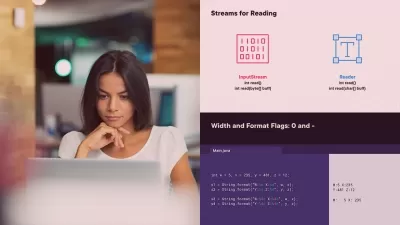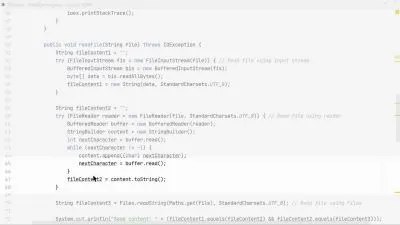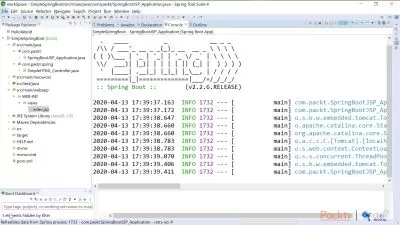Core Java 11 Fundamentals, Second Edition
Focused View
11:34:45
74 View
01-Core Java 9 - Introduction.mp4
02:18
02-Learning objectives.mp4
00:17
03-1.1 Understand the design decisions that shaped Java.mp4
04:23
04-1.2 Become familiar with the history of Java.mp4
10:52
05-Learning objectives.mp4
00:26
06-2.1 Setting up your Java development environment.mp4
03:41
07-2.2 Using the command-line tools.mp4
02:43
08-2.3 Using an integrated development environment.mp4
02:46
09-2.4 Running graphical applications and applets.mp4
06:57
10-Learning objectives.mp4
00:34
11-3.1 Write a simple Java program.mp4
05:53
12-3.2 Work with numeric data types.mp4
18:51
13-3.3 Work with Strings and the API documentation.mp4
14:56
14-3.4 Write programs that read input and produce output.mp4
07:39
15-3.5 Use the control flow constructs of the Java language.mp4
14:48
16-3.6 Work with big numbers when arbitrary precision is required.mp4
02:53
17-3.7 Use arrays to store multiple elements of the same type.mp4
15:19
18-Learning objectives.mp4
00:24
19-4.1 Understand the fundamental concepts of object-oriented programming.mp4
04:45
20-4.2 Work with predefined classes.mp4
15:09
21-4.3 Define your own classes.mp4
12:26
22-4.4 Understand advanced concepts of classes in Java.mp4
08:50
23-4.5 Understand parameter passing in Java.mp4
05:54
24-4.6 Learn more about object construction.mp4
10:15
25-4.7 Work with packages and imports.mp4
16:59
26-4.8 Use the javadoc utility to produce class documentation.mp4
06:14
27-4.9 Design classes effectively.mp4
04:56
28-Learning objectives.mp4
00:33
29-5.1 Understand and define subclasses.mp4
02:17
30-5.2 Override methods and provide constructors in subclasses.mp4
10:48
31-5.3 Understand advanced inheritance concepts in Java.mp4
11:04
32-5.4 Work with the Object class and its methods.mp4
16:26
33-5.5 Understand how inheritance shapes Java language features.mp4
13:42
34-5.6 Use reflection to work with arbitrary objects.mp4
22:53
35-5.7 Use inheritance effectively.mp4
04:04
36-Learning objectives.mp4
00:43
37-6.1 Understand the concept of interfaces.mp4
07:00
38-6.2 Understand the properties of Java interfaces.mp4
05:41
39-6.3 Work with default methods.mp4
10:07
40-6.4 Become familiar with use cases for interfaces.mp4
12:55
41-6.5 Understand how lambda expressions work.mp4
23:32
42-6.6 Understand the inner workings of inner classes.mp4
11:09
43-Learning objectives.mp4
00:30
44-7.1 Use exceptions to report errors in a program.mp4
08:52
45-7.2 Catch exceptions to remedy error conditions.mp4
11:37
46-7.3 Know how to use exceptions effectively.mp4
04:45
47-7.4 Use assertions to enforce algorithm constraints.mp4
04:35
48-7.5 Use logging to record what your program does.mp4
10:33
49-Learning objectives.mp4
00:27
50-8.1 Understand the advantages of generic programming.mp4
04:12
51-8.2 Define a simple generic class.mp4
02:08
52-8.3 Define generic methods.mp4
03:45
53-8.4 Know how to place restrictions on type variables.mp4
03:31
54-8.5 Understand how generic code is translated to run on the Java virtual machine.mp4
09:00
55-8.6 Be aware of restrictions and limitations of Java generics.mp4
17:09
56-8.7 Understand the interaction between generic types and inheritance.mp4
17:45
57-8.8 Work with reflection and generic types.mp4
05:49
58-Learning objectives.mp4
00:22
59-9.1 Understand the benefit of separate collection classes and interfaces.mp4
01:57
60-9.2 Become familiar with the types in the collections framework.mp4
09:09
61-9.3 Work with linked lists and array lists.mp4
10:24
62-9.4 Work with hash sets and sorted sets.mp4
06:36
63-9.5 Work with queues, deques, and priority queues.mp4
02:20
64-9.6 Use maps to organize key value pairs.mp4
09:06
65-9.7 Understand collection wrappers and views.mp4
04:00
66-9.8 Use common algorithms with collections.mp4
05:53
67-9.9 Be able to use collections from old versions of Java.mp4
03:02
68-Learning objectives.mp4
00:19
69-10.1 A Brief History of Java GUI Programming.mp4
03:49
70-10.2 Displaying Information in a Scene.mp4
08:48
71-10.3 Event Handling.mp4
09:49
72-10.4 Layout.mp4
14:32
73-10.5 User Interface Controls.mp4
12:33
74-10.6 Dialogs.mp4
06:33
75-10.7 Fancy Controls.mp4
03:17
76-10.8 Properties and Bindings.mp4
12:25
77-10.9 Asynchronous Processing.mp4
07:33
78-Learning objectives.mp4
00:23
79-11.1 Understand the design decisions behind the Swing Toolkit.mp4
03:02
80-11.2 Be able to display frame windows.mp4
07:16
81-11.3 Display graphical shapes.mp4
05:54
82-11.4 Display colors, fonts, and images.mp4
09:22
83-11.5 Understand how a program can react to user interface events.mp4
11:06
84-11.6 Provide user interface actions that can be activated in multiple ways.mp4
06:18
85-11.7 Handle mouse events.mp4
06:20
86-11.8 Understand the AWT event hierarchy.mp4
03:32
87-Learning objectives.mp4
00:27
88-12.1 Understand how Swing uses the model-view-controller design pattern.mp4
02:53
89-12.2 Be able to arrange user interface components in a window.mp4
05:15
90-12.3 Process text input.mp4
04:46
91-12.4 Present choices in a user interface.mp4
12:03
92-12.5 Implement menus and toolbars.mp4
07:31
93-12.6 Solve complex layout management tasks.mp4
05:36
94-12.7 Use and implement dialog boxes.mp4
10:08
95-Core Java 9 - Summary.mp4
01:46
More details
User Reviews
Rating
average 0
Focused display
Category

LiveLessons
View courses LiveLessonsPearson's video training library is an indispensable learning tool for today's competitive job market. Having essential technology training and certifications can open doors for career advancement and life enrichment. We take learning personally. We've published hundreds of up-to-date videos on wide variety of key topics for Professionals and IT Certification candidates. Now you can learn from renowned industry experts from anywhere in the world, without leaving home.
- language english
- Training sessions 95
- duration 11:34:45
- Release Date 2023/11/03








